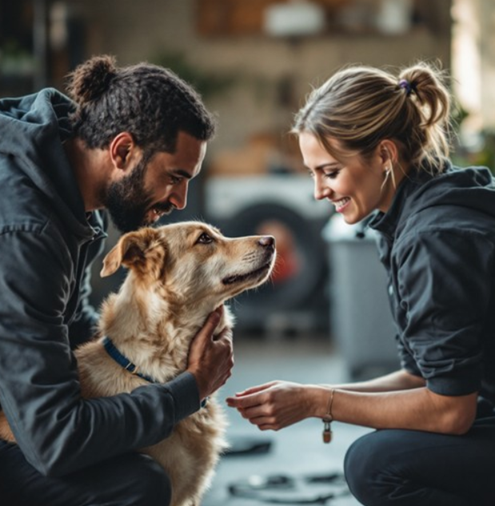5 Things To Know About Training An Aggressive Dog. Training an aggressive dog can feel overwhelming, but with the right techniques, patience, and guidance, it is possible to help your dog become a happier and safer companion. Whether your dog’s aggression stems from fear, dominance, resource guarding, or anxiety, proper training is crucial. Here are five important things you need to know about training an aggressive dog to improve their behavior and rebuild trust.
1. Understand the Root Cause of Aggression
Before any training can be successful, it’s vital to understand why your dog is acting aggressively. Aggression is often a symptom, not a standalone behavior. Dogs may become aggressive due to fear, territorial instincts, medical issues, past trauma, or social dominance.
Working with a certified dog trainer or a veterinary behaviorist can help uncover the underlying causes. A professional assessment ensures the right training methods are used and avoids making the problem worse. Aggression fueled by pain, for example, needs a different approach than aggression caused by fear or anxiety.
 Taking the time to understand the root cause is the first critical step to creating a customized training plan that addresses your dog’s unique needs.
Taking the time to understand the root cause is the first critical step to creating a customized training plan that addresses your dog’s unique needs.
2. Positive Reinforcement is Essential
Many pet owners believe that harsh discipline or dominance-based training is the solution to an aggressive dog. However, modern dog training shows that positive reinforcement is the most effective and humane method for addressing aggression.
Positive reinforcement involves rewarding good behavior with treats, praise, or toys, making it more likely that your dog will repeat that behavior. Instead of punishing your dog for reacting aggressively, you focus on reinforcing calm, non-aggressive responses.
Using positive reinforcement helps build trust between you and your dog, reduces fear-based behaviors, and encourages a willing, cooperative attitude during training sessions. Hiring a professional positive reinforcement dog trainer can dramatically speed up progress when training an aggressive dog.
3. Safety Measures Should Always Be in Place
When working with an aggressive dog, safety must be the top priority, For you, your dog, and others. Proper management prevents accidents and sets up a safe environment for training.
Depending on the severity of your dog’s aggression, your trainer may recommend tools like basket muzzles, leash training, secure harnesses, or controlled exposure techniques. A properly fitted basket muzzle, for instance, allows a dog to pant, drink, and accept treats while preventing bites.
Setting clear boundaries at home, limiting stressful exposures, and keeping your dog in a controlled environment help minimize triggers and keep everyone safe. Remember: management is not a substitute for training, but it is an important part of the process while your dog is learning new behaviors.
4. Consistency and Patience Are Key
Training an aggressive dog doesn’t happen overnight. Consistency and patience are two of the most important elements for success. Aggression is a deeply ingrained behavior, and it often takes weeks, months, or even longer to see substantial improvements.
 Each training session should be short, focused, and positive. Repetition helps reinforce desired behaviors and reduces reactive responses over time. Stick to the training plan every day and avoid sending mixed signals to your dog.
Each training session should be short, focused, and positive. Repetition helps reinforce desired behaviors and reduces reactive responses over time. Stick to the training plan every day and avoid sending mixed signals to your dog.
It’s also important to celebrate small wins. Even minor improvements, like a shorter barking episode or quicker calming down, mean progress is happening. Staying patient during setbacks and recognizing that behavior modification is a long-term journey will keep you motivated and help your dog succeed.
5. Professional Help Makes a Big Difference
Aggressive dog behavior is complex and can be dangerous if handled incorrectly. That’s why seeking help from a certified professional dog trainer (CPDT-KA) or a certified behavior consultant (CBCC-KA) is highly recommended.
These professionals are trained to evaluate behavior accurately, create customized training programs, and guide you step-by-step through the process. They use science-backed methods to desensitize and counter-condition aggressive reactions safely.
Many aggressive dog trainers also work with veterinarians to rule out medical issues or prescribe medication if needed to assist with severe anxiety or fear-based aggression. Remember, you don’t have to handle it alone. Partnering with an experienced dog behaviorist can accelerate progress, enhance safety, and give you peace of mind.

Did you find this article useful? Would you like 100% free access to more articles like these, and free access to over 5,000 vetted pet care service professionals throughout the United States? Sign up here for a free Petworks account, and take 10% off your first booking, on us!
Why Training an Aggressive Dog Matters
Helping an aggressive dog through training is not just about stopping bad behavior — it’s about improving their quality of life. Aggressive dogs often live with high levels of stress, fear, or confusion. Proper training builds their confidence, reduces their anxiety, and strengthens the bond between you and your pet.
Training an aggressive dog also protects your family, visitors, and other animals. Investing time, effort, and resources into professional behavior modification can lead to a happier, calmer, and more predictable companion.
Common Causes of Aggression in Dogs
Understanding the different types of aggression can help tailor your training approach:
-
Fear Aggression: Defensive behavior triggered by fear or anxiety.
-
Territorial Aggression: Protectiveness over home, property, or family members.
-
Possessive Aggression: Guarding food, toys, or other valued objects.
-
Pain-Related Aggression: Acting out due to injury or illness.
-
Social Aggression: Hierarchical behavior among dogs or with humans.
-
Protective Aggression: Guarding pack members or young.
A full behavioral assessment helps identify which type(s) of aggression your dog is showing, ensuring a more effective training plan.
Signs You Should Seek Professional Help Immediately
If you observe any of the following signs, contact a professional dog trainer or behaviorist right away:
-
Repeated growling, snarling, snapping, or biting.
-
Lunging at strangers, other animals, or family members.
-
Guarding food, toys, or spaces aggressively.
-
Severe fear responses or unpredictable reactions.
-
Escalating aggression despite attempts to manage it.
Early intervention can prevent aggressive behavior from worsening and make training much more effective.
You Can Help Your Aggressive Dog Thrive
Training an aggressive dog is a challenging but rewarding experience. With an understanding of your dog’s behavior, positive reinforcement techniques, proper safety measures, consistency, and professional help, real progress is possible.
Always remember: Aggressive behavior is a sign your dog needs help, not a reason to give up on them. With dedication and compassion, you can help your dog learn safer, more appropriate behaviors and enjoy a better, more peaceful life together.
If you’re ready to start the journey toward a calmer, happier relationship with your dog, reach out to a certified dog trainer near you or schedule a consultation with an experienced behaviorist today.
About Us
 In 2021, Dr. Marty Goldstein DVM joined the pet care platform Petworks as an advisor in its Animal Nutrition care division. Dr Marty Nature’s Blend is on a mission to help your pets live their healthiest lives possible. Dr. Marty’s pet nutrition expertise and guidance has helped Petworks evolve and become the preeminent animal and pet nutrition consultation service for pet parents in North America.
In 2021, Dr. Marty Goldstein DVM joined the pet care platform Petworks as an advisor in its Animal Nutrition care division. Dr Marty Nature’s Blend is on a mission to help your pets live their healthiest lives possible. Dr. Marty’s pet nutrition expertise and guidance has helped Petworks evolve and become the preeminent animal and pet nutrition consultation service for pet parents in North America.
 In 2022, Blue Buffalo Founder Bill Bishop Jr. joined Petworks as Senior Advisor in our Animal Nutrition Care Division. Bill brings his extensive expertise in pet food innovation and business leadership. His guidance helps Petworks enhance our pet nutrition service offerings, helping to ensure that pet parents throughout the world receive trusted, science-backed nutritional support for their dogs, cats, and animals.
In 2022, Blue Buffalo Founder Bill Bishop Jr. joined Petworks as Senior Advisor in our Animal Nutrition Care Division. Bill brings his extensive expertise in pet food innovation and business leadership. His guidance helps Petworks enhance our pet nutrition service offerings, helping to ensure that pet parents throughout the world receive trusted, science-backed nutritional support for their dogs, cats, and animals.
About The Author
 Petworks Co-Founder Kevin Kinyon is a life-long animal lover who works tirelessly to improve the lives of pets and their parents. Human and animal qualities he values most are integrity, humor, and empathy.
Petworks Co-Founder Kevin Kinyon is a life-long animal lover who works tirelessly to improve the lives of pets and their parents. Human and animal qualities he values most are integrity, humor, and empathy.


